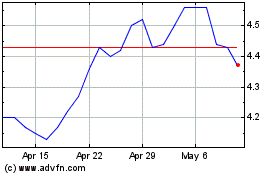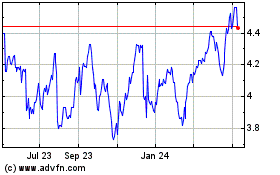Telefónica Profit Plunges on Currency Moves -- 2nd Update
July 28 2016 - 11:11AM
Dow Jones News
By Jeannette Neumann and Ana García Ruiz
Telefónica SA's shares led losses on Spain's benchmark index
Thursday as investors eager for details on how the company plans to
whittle down its debt load largely came up empty-handed when it
reported second-quarter earnings.
The Spanish telecommunications giant also reaffirmed its
dividend for 2016, despite calls from analysts to cut the payout to
help trim more than EUR50 billion ($55.3 billion), in debt.
Telefónica executives assured analysts during a presentation
that strong free cash flow would help the company stay apace of its
debt pile. Executives also said they were also considering issuing
a type of bond that doesn't fully count as debt.
Telefónica shares were down 4.7% in midafternoon trading in
Madrid despite results that were broadly in line with what analysts
had expected. The decline comes after a steady increase in
Telefónica's share price over the past month.
The company reported net profit was EUR693 million in the
quarter versus EUR1.52 billion a year earlier and said that a
decline in the currencies of Brazil, Argentina and the U.K. against
the euro, as well as other currency fluctuations, had shaved 9.1
percentage points off revenue in the quarter.
Revenue was EUR12.72 billion, a 7.7% decline from a year
earlier. Operating income excluding depreciation and amortization
was EUR3.92 billion, a 7.1% drop.
Investors have been seeking reassurance that Telefónica plans to
pick up the pace on paring debt after the European Commission
blocked the company's sale of its British mobile operator O2.
Telefónica had tried to sell O2 to cut its debt load, but the
Commission said the acquisition by CK Hutchison Holdings Ltd. would
have resulted in higher prices and fewer choices for U.K.
customers.
Analysts at credit-rating firms warned that Telefónica still
needed to trim debt or risk a potential downgrade of its
investment-grade credit rating.
As Telefónica executives went back to the drawing board to
figure out what to do with O2, Britons voted to leave the European
Union. The following week the telecoms company announced it would
consolidate the British operator back into its financial
statements.
Telefónica executives said Thursday the company was weighing its
options with O2, such as a minority divestment or a private
transaction.
But the U.K. vote to leave the EU hasn't been all bad for the
company. Kepler Cheuvreux analyst Javier Borrachero noted in a July
11 report that around 13% of the company's net debt is in sterling
and the currency has dropped around 9% against the euro following
the June 23 referendum.
The Brexit vote has also pushed back expectations of an increase
in interest rates by the U.S. Federal Reserve, which has helped to
buoy emerging market currencies such as the Brazilian real.
Investors tend to pull money out of emerging markets if they
believe there will be higher interest rates, and therefore higher
returns, in the U.S.
Since that hasn't happened, the Argentine peso and the Brazilian
real--which had been a drag on earnings and Telefónica's share
price--have bounced back, while more market-friendly governments in
the region are also helping to brighten the outlook for the
telecommunications company, Mr. Borrachero said.
"An increasing appetite for emerging markets risk is key for
Telefónica, as the stock is still seen as a Latin American proxy,"
he added.
On the other hand, if the Fed raises rates and that in turn
deflates emerging-market currencies, Telefónica's valuation could
suffer.
Write to Jeannette Neumann at jeannette.neumann@wsj.com
(END) Dow Jones Newswires
July 28, 2016 10:56 ET (14:56 GMT)
Copyright (c) 2016 Dow Jones & Company, Inc.
Telefonica (NYSE:TEF)
Historical Stock Chart
From Mar 2024 to Apr 2024

Telefonica (NYSE:TEF)
Historical Stock Chart
From Apr 2023 to Apr 2024
